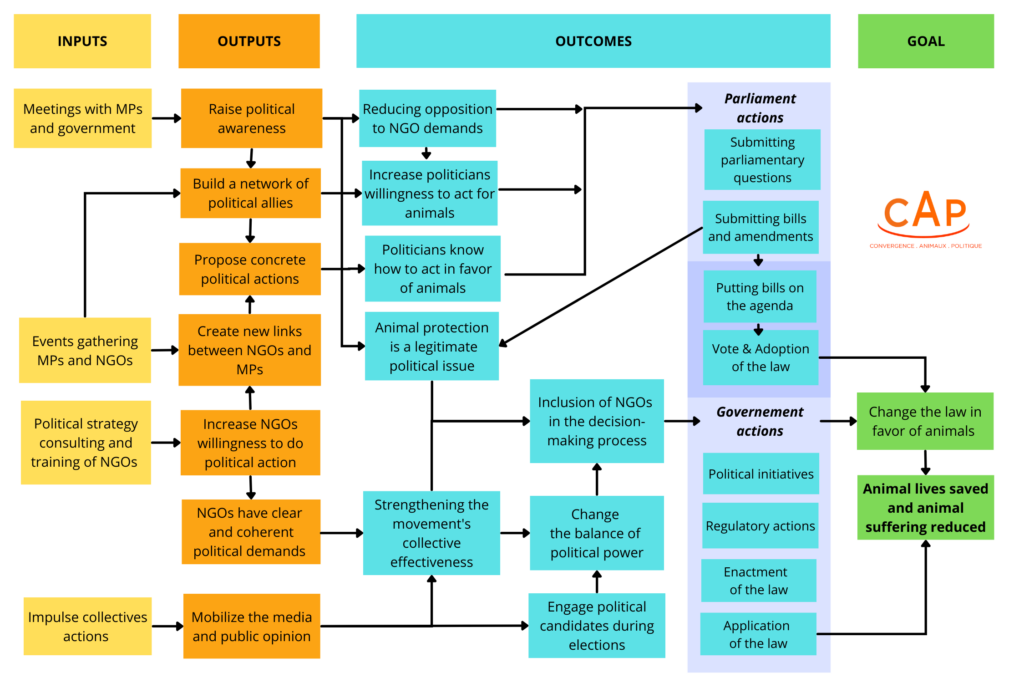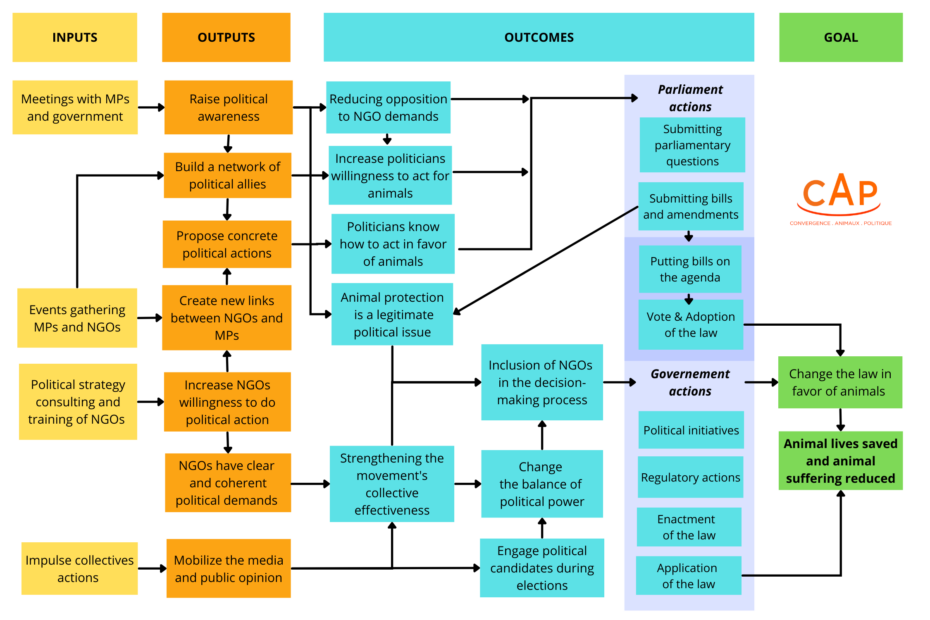Convergence Animaux Politique (CAP) presents its impact strategy: discover our theory of change to save animal lives and reduce animal suffering.
To understand the importance of theory of change, see this post on Effective Altruism forum.
Most issues related to animals are intrinsically linked to institutionalized practices and frameworks, such as farming conditions, wildlife protection, animal testing regulations, and more. Animal protection goes beyond individual ethics; it is a matter of collective, political responsibility. To impact as many animals as possible, CAP operates at the political level on behalf of 25 partner NGOs, primarily on a national scale, to change the law in favor of animals.
The creation of CAP in 2016 resulted from the observation that while animal protection was becoming an important issue for public opinion and the media in France, politicians did not concern themselves with it, as they did not perceive it as a politically legitimate topic. Hence the law did not change, and animals did not see their condition improve. To quote Lewis Bollard, “our challenge is to convert the popular support we already enjoy into the legal protections that […] animals deserve.”
Weaknesses of the French animal movement that CAP aims to address
We identified several reasons for this lack of political interest and action in France:
- Very few Animal NGOs lobbied politicians and the ones that did, did it on a small scale and rather occasionally, which did not allow for the building of a sustained network of political allies.On the other hand, lobbies that favor the status quo and the exploitation of animals had long established influential networks, relying on significant financial resources.
- NGOs sometimes had differing agendas and political demands, which made them less clear and less visible for politicians (who most often will not take the time to decipher the positions of various groups to draw a consensus).
- Politicians interested in animal issues often did not know who to turn to for advice and support, because they lacked knowledge about the animal movement. There was a need for a clearly identified actor that would be able to act as an intermediary and to redirect politicians towards the relevant organizations on specific topics.
- Because very few politicians took public stances or political action for animals, sympathizing Members of parliament (MPs) often did not dare to do so, by fear of being marginalized and hence losing political leverage.
How CAP seeks to bring about change
To achieve political change for animals, the main strategy of CAP is to bring more animal NGOs to lobby politicians, more massively and in a more coherent manner, and to create, grow and sustain a network of political allies in Parliament, in order to be able to mobilize it when needed, to build majorities, inside parliamentary groups, or more generally in parliament. Indeed, the support of a few MPs is not enough for bills to be passed, or even debated upon: for a bill to be put on the agenda, a parliamentary group needs to collectively agree to prioritize it and use its right to set a chamber’s (National Assembly or Senate) agenda.
CAP’s actions can be summed up to four main inputs:
- We obtain meetings with MPs and members of the government (nearly 350 in seven years). Our goals are to raise their awareness of animal issues and of the political demands of our partner NGOs and push them to act upon them. We also aim to sound out their opinion and their willingness to act upon specific issues, which will help us and our partners to know who to appeal to when we need support on these issues in the future.
- We organize three events every year, gathering politicians and NGO representatives. These are opportunities for the latter to directly express their demands to a large number of decision makers (on average, 30 MPs are present or represented), but also for politicians to network with NGOs and among themselves. This is a place where they can identify colleagues who can be allies for them on animal issues and thus be empowered to act.
- We advise our 25 partner NGOs on which actions to take, what demands can be politically relevant, who to target and when, how to address these targets. Very often, they have strong expertise on the issues they deal with, but they lack this ‘meta’ expertise and this can be an obstacle for them to do lobbying work, or to do it efficiently. That is why we also organize training for NGOs to develop new skills and be more efficient.
- We impulse collective actions: opinion columns in mainstream newspapers (with NGOs but also sometimes politicians, celebrities, scientists…), collective letters to political actors, ad hoc campaigns (for example getting election candidates to commit to animal protection). These allow for pressuring political actors by resorting to the collective weight of the movement.
Through these actions we reduce political opposition to the demands of NGOs and increase politicians’ willingness to act for animals, as well as their ability to do so, through the expertise of NGOs. By bringing more and more politicians to show support for animal protection, we also make it a legitimate political issue (this support can take the form of parliamentary questions, bills and amendments -whether they go through debate or not, signing an opinion column…) and pressure the government. Through the connections we have established in the political sphere, we allow for animal NGOs to be included in the decision-making process, for example through parliamentary auditions or ministerial working groups.
Those primary outcomes lead :
- Parliamentary groups to put bills in favor of animals on the parliament’s agenda, so that a vote can occur.
- The government not to oppose parliamentary initiatives (in a majority system like France a bill has very little chance to pass if the government opposes it), and sometimes to favor them, or even propose legislation itself or take regulatory actions. This is achieved via direct lobbying, or the pressure devices already mentioned, such as public and media campaigns, opinion columns, the tabling of parliamentary questions… The tabling of amendments and bills can also serve that purpose, as they show parliamentary support for animal protection.
- The government to properly enact and apply the law after it is voted on.
Thus, our end goal is reached, as changes in the law allow for animal lives to be saved and/or the reduction of animal suffering. Finally, it should be noted that changes in the law also feed back into the process, as they legitimate further political action (e.g. in 2021 we obtained the passing of an encompassing and ambitious bill on animal protection, one aspect of which was to ban the captivity of wild animals in circuses or in delphinaria. This is something we were able to use to successfully push a later amendment in another bill in 2023, that made it illegal for influencers to promote the keeping of wild animals).
CAP was supported by Animal Charity Evaluators in 2022 & 2024 and recommended by Effective Altruism France in 2023 for its effective animal advocacy work.
For a more visual approach, please see the diagram version of our theory of change:






